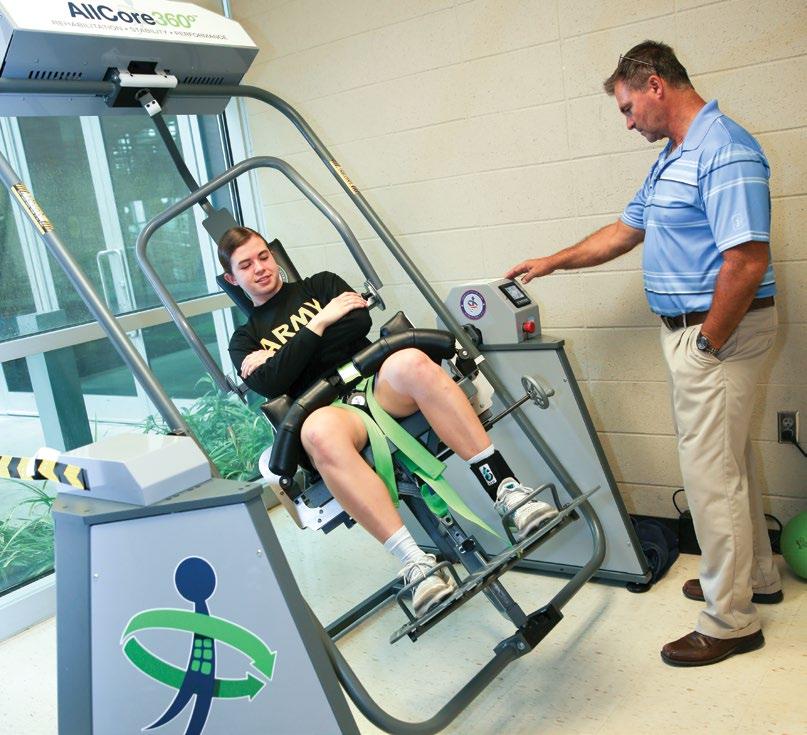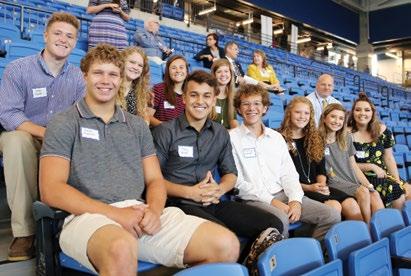
8 minute read
Moving the needle to fill healthcare jobs
By Clark Leonard Photos by Peggy Cozart
From the Regional Education and Economic Development (REED) Summit to a pair of new degrees, hosting post-professional Doctor of Physical Therapy (ppDPT) students from overseas and partnerships across the healthcare industry, the College of Health Sciences & Professions at UNG is preparing students to fill one of Georgia’s fastest-growing career fields.
Advertisement
Titled “Not Everyone in Healthcare Wears Scrubs,” the Sept. 6 REED Summit at the Convocation Center on UNG’s Dahlonega Campus sought to show the wide variety of jobs available in healthcare to the northeast Georgia community.
Next year, two UNG degree programs will help educate students to stem the shortage of healthcare professionals in Georgia and nationally. In May, the university received University System of Georgia (USG) Board of Regents approval for a Doctor of Nursing Practice (DNP) degree, and Southern Association of Colleges and Schools Commission on Colleges approval is pending. Then, in August, the Board of Regents approved a bachelor’s degree in healthcare services and informatics administration.
900+
System
CONTINUING TO EDUCATE NURSES
Dr. Teresa Conner-Kerr, dean of UNG’s College of Health Sciences & Professions, said with the Master of Science in Nursing Practice being eliminated and the DNP becoming an industry standard, the new degree is crucial to UNG’s efforts.
“This really allows us to continue to educate nurses,” Conner-Kerr said.
At the national level, Conner-Kerr said a need exists for 2 million more nurses. By providing the DNP, UNG is training faculty to increase the number of nurses with bachelor’s degrees.
The U.S. Department of Health and Human Services projects that the shortage of primary care physicians will reach an all-time high in 2025. In the South, the projected shortage is some 13,860 primary care physicians. In Georgia, the 2016 Kaiser Family Foundation report indicates the state only has 60 percent of needed primary care providers, and Georgia is ranked 39th in the nation in the ratio of doctors per 100,000 people.
“It’s hugely exciting for us to know that we’re going to be able to shift the needle on providing faculty, as well as providing care
Student Victoria Chin-Young works during a graduate-level nursing class at UNG, which has received Board of Regents approval for a Doctor of Nursing Practice. Approval by the Southern Association of Colleges and Schools Commission on Colleges is pending.

in Georgia,” Conner-Kerr said.
Currently, more than 900 UNG nursing students are doing their clinical rotations, with more than 700 of those students at Northeast Georgia Health System, Northside and Children’s Healthcare of Atlanta facilities.
Dr. Sharon Chalmers, head of the Department of Nursing, said the DNP program will help fulfill a critical need for healthcare in the region.
“The Appalachian north Georgia region is made up of rural counties and populations with many unmet healthcare needs,” Chalmers said. “Students in our DNP program will have opportunities to serve these residents by implementing strategies to address their healthcare needs at a system level.”
The DNP degree is open to graduates who have earned a master’s degree in nurse practitioner. The 38-hour post-master’s program will be offered online with two required face-to-face sessions and also will require the completion of an additional 500 hours of clinical practice beyond the master’s degree requirements as part of the DNP work.
Cadets prepare to lead in a global society

BRIDGING THE HEALTH INFORMATION GAP
The healthcare services and informatics administration degree seeks to bridge the gap between medical and information technology (IT) professionals, said Dr. Pamela Charney, a UNG associate professor who will be the program chair for the new degree.
“Right now both sides speak entirely different languages, and that’s why we have so many problems with healthcare information,” Charney said.
The degree will be offered through a mix of in-person and online classes and will be based on UNG’s Cumming Campus potentially by spring 2019.
It will meet a major workforce need, as Conner-Kerr said 5,500 such jobs are currently unfilled in Georgia.
Three classes that will be central to what students take from the healthcare services and informatics administration degree will be electronic health records essentials, usability and healthcare data analytics.
Conner-Kerr said four pathways will be offered within the degree: data analytics, consumer health, healthcare administration, and destination medicine. Students will be able to select one or two main pathways while having the chance to learn from pieces of the others.
“This is a very innovative, entrepreneurial degree,” Conner-Kerr said.
Another vital component of the program will teach students how to protect patients’ health information in an era when health information has become more valuable than financial information, Charney said. She said stolen health information can be used for Medicare fraud or to access the person’s health insurance.
UNG currently has certificate programs in health informatics and health care administration, which will become part of the bachelor’s degree. This will allow the students pursuing the certificates to further their education.
Conner-Kerr said this will be a degree that’s responsive to students’ and employers’ needs.
“It certainly is going 5,500 healthcare jobs are currently unfilled in Georgia. to allow our students to have jobs,” she said.
INNOVATIVE TOOLS, NEW FACILITI ES
Another resource available at UNG that will help train students is the AllCore360°, a $40,000 innovative machine that helps a variety of patients gain strength by activating their muscles in sequence as they are rotated 360 degrees. Alltrand, the machine’s manufacturer, has provided the equipment at no cost for UNG’s physical therapy faculty and students to use for research and testing.
“It’s exciting to be the first program in the state that Alltrand wants to partner with,” Conner-Kerr said.
Another important development for the College of Health Sciences & Professions is UNG’s eventual acquisition of the Chestatee Regional Hospital property in Dahlonega.
While UNG will not occupy the space for the next couple of years, UNG President Bonita Jacobs said the facility could potentially house nursing, physical therapy, and counseling education programs, as well as two existing outreach clinics from the counseling and physical therapy departments that are designed to serve specialized health needs of the community.
“We are very grateful to Gov. Nathan Deal, Sen. Steve Gooch and the Board of Regents for their leadership in facilitating this purchase that will ensure healthcare for this rural community long-term, while also improving healthcare education opportunities,” Jacobs said.

UNG assistant professor Michael Polascik helps Erin Hagebusch, a senior cadet majoring in nursing, exercise on the AllCore360°, a machine that helps patients gain strength by activating their muscles in sequence as they are rotated 360 degrees.
Students from Lumpkin County High School attended the REED Summit to learn about the future of healthcare in Georgia.
REED SUMMIT Connecting students with healthcare industry professionals
By J.K. Devine Photos by Peggy Cozart

As a UNG freshman, Halee Stone knows she wants to work in the healthcare field, but is not sure which profession to pursue within the industry.
To find a possible answer, the Ellijay, Georgia, resident attended the inaugural Regional Education and Economic Development (REED) Summit held this fall at the Convocation Center on UNG’s Dahlonega Campus. Presented in partnership with Northeast Georgia Health System, the REED Summit connected prospective and current college students who want to work in the healthcare industry with an array of career opportunities in that field and exposed them to educational pathways and industry professionals.
That worked for Stone. She met with a representative from Avita Community Partners, which has facilities in Dahlonega and Gainesville. Avita is a resource for individuals and families in northeast Georgia experiencing the disabling effects of mental illness, developmental disabilities and addictive diseases. Its goal is to assist in the development of safe, stable and meaningful lives for all.
Stone said she mentioned her desire to possibly earn a degree in music therapy. Allan Harden, human resources director for Avita, explained one of his licensed counselors has incorporated music therapy into a treatment. It was music to Stone’s ears.
“I thought, ‘Wow!’ this is the perfect information that I need to hear,” she said. “So, coming (to the REED Summit) definitely helped me narrow down my career options.”
Stone was not alone. College and high school students as well as professionals in the healthcare field benefitted from the REED Summit. Vendors and sponsors introduced students to many future career opportunities.
The REED Summit included speakers from the private and public healthcare industry as well as panel discussions from experts. Other speakers and panelists included Frank Berry,
UNG’s inaugural REED Summit connected prospective and current college students with career opportunities and industry professionals.

commissioner of the Georgia Department of Community Health; Ben Hames, deputy commissioner of workforce for the Georgia Department of Economic Development; and Amy Carter, deputy commissioner of rural Georgia for the Georgia Department of Economic Development. Also, Joel Simon, with the national Council for Adult and Experiential Learning, spoke about how partnerships between industry and educational institutions can improve opportunities for students, such as providing educational credit for prior experience, and enhance community prosperity.
The summit stems from the UNG’s REED Initiative, which was launched by UNG President Bonita Jacobs as part of the university’s Complete College Georgia Plan. The initiative’s aim is to build collaborations and share successful community practices to increase education attainment across the northeast Georgia region and strengthen the region’s economy.
Kay Keller, director of economic development and community engagement at UNG, said future summits will focus on other high-demand career opportunities and industries that have a significant economic impact in northeast Georgia.









